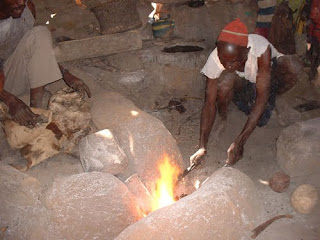
On Christmas morning I made a great personal religious discovery. No, it really wasn't an epiphany surrounding the Christ child, though I really did enjoy having 3 1/2 year old present on December 25. No, it wasn't from the Bible, per say. And, no, it did not involve the well-worn re-recognition of what sleeplessness feels like (I went to bed at 1:00AM after four services, and woke up at the crack of ?!?!?!?). My great personal religious discovery on Christmas morning was what the Holy of Holies, at the heart of the temple smelled like for those who were privileged enough to take it in, to experience it. In the church on Christmas morning, I smelled;
Smoke and....Something
Let me offer more explanation. On Christmas morning, I realized, halfway through my third cup of Java, that I had forgotten my wallet and cell phone down at the church. So, around 11:00AM, I drove down to the church to retrieve them. I should explain that when I say, "church", I mean the 16,000 square foot box that we built some 4 years ago on our property. 16,000 square feet is woefully small for our current space needs at Highlands. I believe that Kobe Bryant has a guest house that is larger than 16,000 square feet. So, the night before, 1,787 people crammed into 16,000 square feet, four times. 1,787 held candles aloft as Ave Maria was sung. 1,787 people sat (many stood) nearly on top of one another, hip to hip, cheek to jowl, candle to candle. 1,787 people listened, with half a brain on the message, and the other half on the trampolines they still had to assemble sometime that night. When I entered the room the next morning, there was;
Smoke and....Something
The Bible says that when Zechariah, John the Baptist's father, was on temple duty; "He was chosen by lot, according to the custom of the priesthood, to go into the temple of the Lord and burn incense. And when the time for the burning of the incense came, all the assembled worshippers were praying outside." What did Zechariah experience in there? What did he see? What did he smell? I think I now know! He smelled what I smelled on Christmas morning at Highlands;
Smoke and....Something
The smoke at Highlands was easily explicable. We had 1,787 candles the night before. In addition, we had two brightly kindled fires outside the church doors to welcome in visitors with the light of Christ. The smoke in the temple of Jerusalem was equally easily explicable. Incense in the temple had been a traditional smell of God, ever since the Exodus. Smoke was the most important part of the "burnt offering" (whatever that may be - a goat, a sheep, a dove). It was the smoke that arose to God, and the heavens, not the actual meat that was offered. And, of course, incense, frank-incense to be specific, was given to Jesus at his birth. The smoke was easy to explain. But what was the...Something?
At Highlands, it is hard to say what it was. Was it the maliforous smell of many bodies packed closely together, from the nearly 2,000 visitors the night before? Maybe. Was it the smell of panic and fear that the human body produces when in near shock, perhaps by a mother or a grandmother, they remembered that the oven was still on at home? Dinner was burned. Possibly. What was the Something that Zechariah smelled in the temple? The Bible says that, "An angel of the Lord appeared to him, standing at the right side of the altar of incense." Was it the smell of angels? What do angels smell like? Do they smell at all?
Or let me offer a radical explanation. Was the smell in both places some extra-terrestrial encounter with the Spirit of God? The great Hebrew scholar, and father of the modern Hebrew language, Rabbi Elizeer Ben-Yehud, translated Genesis 1:1 as; "In the beginning God created the heavens and the earth...and the Spirit BROODED over the waters." Was the smell I smelled on Christmas morning, and the smell that Zechariah smelled in the temple, that of the Spirit of God - BROODING? I will never know. No one will ever know. All I can say is that the smell was;
Smoke and...Something
All for Now,
GB



















